Topical Relevance – Guide to Building Niche Authority for SEO Rankings
Understanding and developing topical relevance for your website is essential for SEO.
Here’s what it is, why it’s used, and how to build it for a maximum impact in the SERPS.
What is topical relevance?
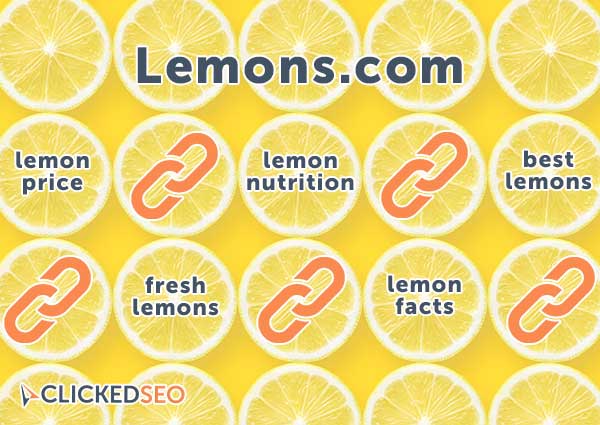
Topical relevance (also called topical authority, niche authority, and niche relevance) refers to a search engine’s interpretation of a website’s niche and what topics it has expertise, authority, & influence on.
Search engines look for topical relevance signals from websites when deciding which pages to serve in their results.
A website with a high topical relevance for “apartments” will have a much easier time building & ranking pages centered around this topic. They have built up topical authority and trust with search engines by establishing themselves as experts.
How is topical relevance determined by search engines?
Topical relevance & authority is influenced by 2 factors: content and links.
With content, the more articles & rankings you have centered around your topic, the higher your topical relevance (authority) will be.
With links, the more relevant inbound backlinks that you have from other sites with topical authority in your target niche, the higher your topical authority will be. Effective use of internal linking will help pass the value of these backlinks throughout your site.
Here’s how to use content & backlinks together to build the topical relevance of your website.
Building topical relevance with content

As an SEO, your ultimate goal is (probably) ranking keywords with transactional intent in your field.
If you’re a local dentist, then your million dollar keyword is “dentist near me” out of your target location. If you’re an ecommerce site that sells shoes, then you want to rank “buy shoes online”, “shoes for sale”, and so-on.
How do you rank these high-value service pages? One big way is by building topical relevance with a content SEO (blogging) strategy.
The more high-performing, informational intent blog articles that you have centered around your target topic, the more likely you will be able to rank your service or “money” pages and keywords.
For example, if I run a website that sells antivirus software, then one of my money keyword is “best antivirus software”. To build topical relevance for the topic “antivirus software”, I create blog articles that provide information about antivirus software. To get blog keyword ideas around this topic, use a keyword research tool such as Ahref’s Keyword Explorer or Google’s Keyword Planner.
Blog ideas for building topical relevance in the “antivirus software” niche would include topics like “What is Antivirus Software?” “What Does Antivirus Software Cost?” ‘How Does Antivirus Software Work?” and so-on.
So simply put, to build topical relevance with content, write strategic informational articles about that content. This shows search engines that you are an expert on the topic, and this will help rank your service pages.
The best way to build topical relevance with your content is with the pillar cluster model. With the pillar cluster model, you write 1 long-form informational intent article about a certain topic – that’s your “pillar page”. Then, you write more specific individual articles for each sub-topic – those are your “cluster pages”.
Here’s an example for a website in the moving niche:
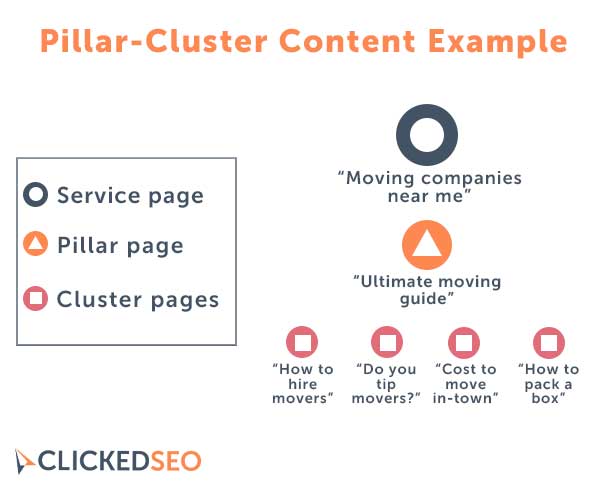
Service (money) page
“Moving Companies Near Me”
Pillar page
“Moving Mega Guide – Everything You Need to Know About Moving”
Cluster pages
“How to Hire Movers”
“Do You Tip Movers?”
“What does it cost to move in-town?”
“How to pack a moving box”
etc.
In your pillar page, you briefly touch on every topic of your cluster pages. Then, you use your cluster pages to write a more in-depth article centered around that specific topic.
Your pillar and cluster pages will work together to build topical authority, and in turn rank your service page.
Lots of good content around your niche alone is not enough to build topical authority, however. You need links. Keep reading.
Building topical relevance (authority) with backlinks
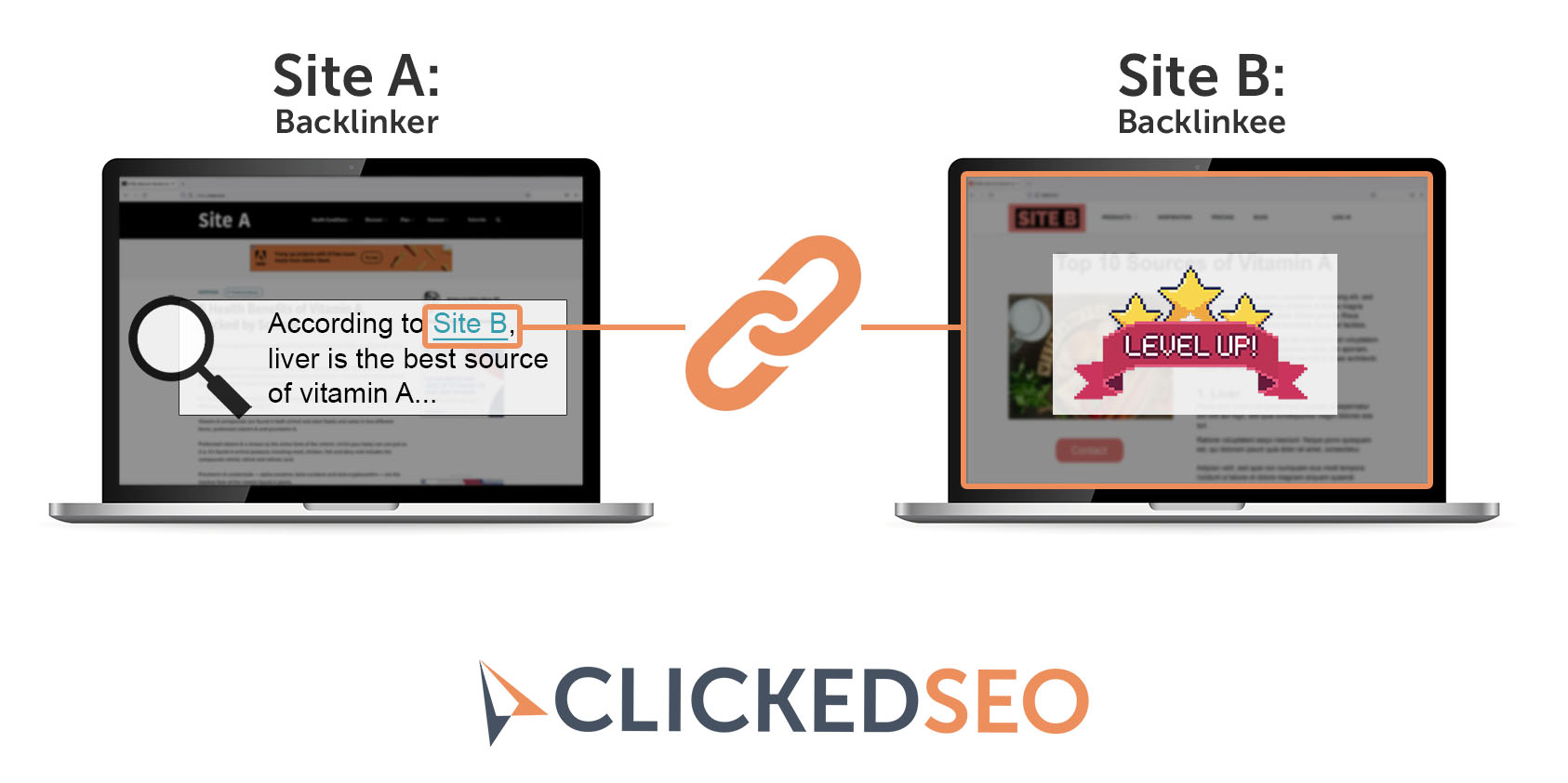
A backlink is when one website links from their website to your website. Inbound backlinks count as “votes of trust” for search engines and they use them as a ranking signal. So the volume of quality of inbound backlinks determines the likelihood of a website & its pages showing up in the search results.
Remember, topical relevance can also be called topical “authority”. As it relates to backlinks, topical authority is a more applicable term, because the word “authority” is usually in the context of “domain authority” which focuses on backlinks.
Websites that have a strong inbound backlink profile from other websites that have rankings & traffic in the same niche will have a high topical authority.
So to build topical authority (relevance), you need to build backlinks from other websites that have topical authority in that field.
To determine the topical authority of a 3rd party website, you need to check the types of keywords they are ranking for and are bringing them traffic. Use a paid tool such as Ahref’s to check the organic rankings and traffic of any website.
If a website is ranking for & generating traffic from keywords that are relevant to your niche, then bingo, you want a backlink from them.
If a website is ranking for keywords that are irrelevant to your niche, then the backlink may still help, but it will be less effective (this scenario would help build your “domain authority” but not “topical authority”).
If the website has a high “domain authority” and traffic centered around spammy terms such as “best proxy sites”, “online gambling free”, etc., then you don’t want a link from them (they probably sell links).
If the website has a low authority and little to no keywords or rankings, then that link will offer little value too.
For example, let’s say my website is examplefitnesswebsite.com and I sell online workout videos. My money keyword is “workout videos”. To build topical relevance, I need inbound backlinks from other websites that have rankings, traffic, & domain authority about fitness & workouts.
When I am prospecting websites to pitch my content to for a backlink, I want to find websites with rankings and traffic centered around my niche. If I see a website ranking for and generating traffic from keywords like “best ab workouts”, “how many calories are in a pound”, “weight lifting for weight loss”, etc., then I want a link from them.
So simply put, inbound backlinks from other websites that rank the types of keywords that you want to rank will help you build topical authority and rank yourself.
Using internal linking to pass link equity
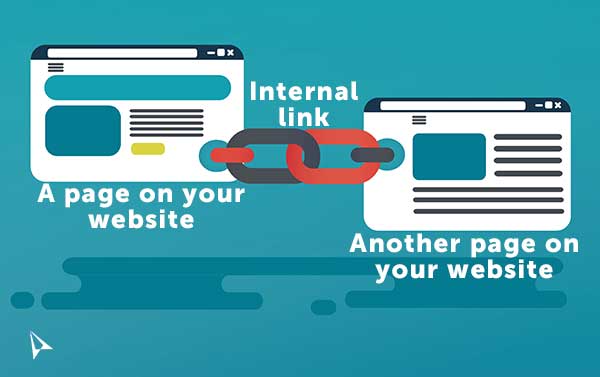
Now that we’ve covered the hard part of building relevant content and inbound backlinks, it’s time to cover the easy part – internal links. Internal links are some of your lowest hanging fruit in the SEO world.
Internal linking is when you place a link from one article on your website to another article on that same website. For example, if you go back to the paragraph before this one, I placed an internal link to my “Lowest Hanging Fruit in SEO” page.
Internal linking works by passing link equity or “link juice” from your inbound backlinks over to other pages. If I receive a backlink to one page, I can pass some of that link’s value to my other pages by interlinking to those pages from the article that received the backlink.
Internal links will pass link equity evenly across your other pages. So if you internally link from 1 page to 3 other pages, that link value will be split 3 ways.
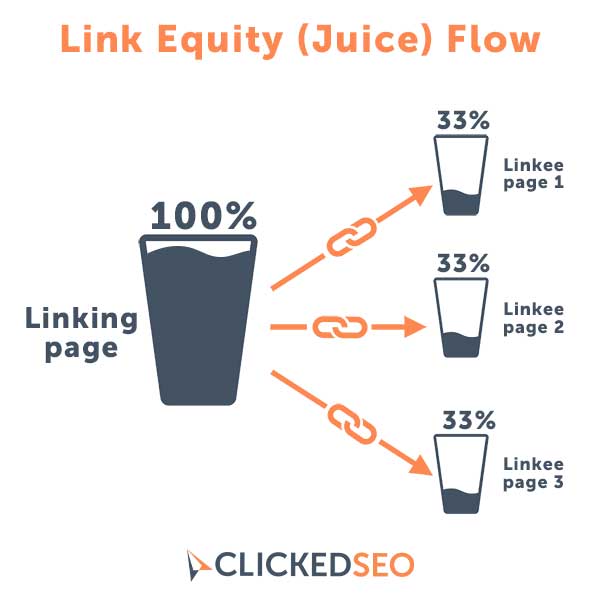
Use internal links just like you would use links anywhere else. Place them relevantly & naturally within your copy to help support your article and provide additional resources.
Since you have full control of your own website and can simply place internal links wherever you see fit, they are 5,000x easier to create than backlinks.
That being said, internal links won’t help much without backlinks to pass the value from. They also won’t work if you don’t have informational content to swap the links between.
You need to combine relevant content, backlinks, and internal links together to build topical relevance & rankings. Keep reading for a visual representation.
Tying it all together: Building topical relevance using pillar-cluster content, backlinks, and internal links
Remember, you build topical relevance (authority) by creating pillar & content clusters, building inbound links (backlinks) from other websites, and passing the value of those links throughout your website with internal links.
Here’s what that all looks like:
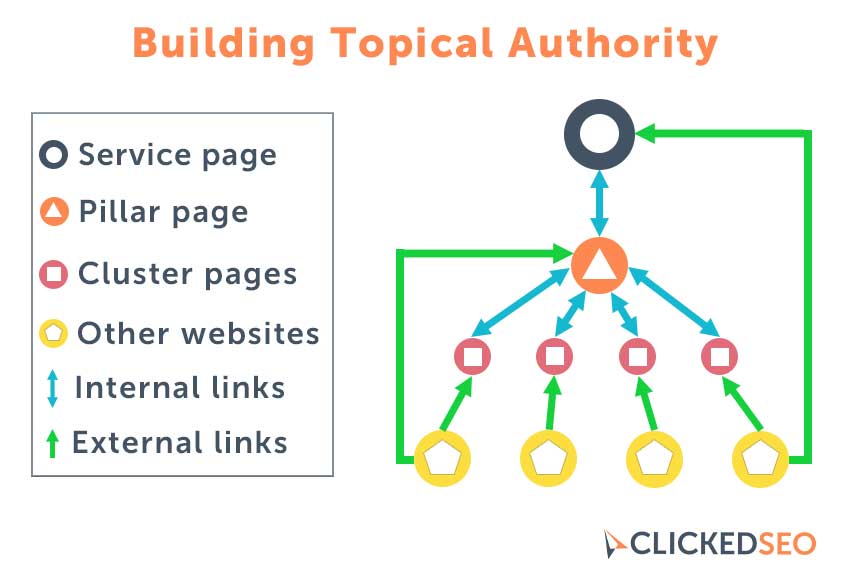
In the above example, the blue circle is your service page – the page that you want to rank to drive inbound business. Everything that happens below this blue circle is what you do as an SEO to enhance the rankings of this page.
The orange circle is your pillar page, a broad, long-form informational article centered around the topic of your service page.
The pink circles are your cluster pages – pages that cover each pillar page subtopic in-depth.
The yellow circles are external, topically relevant websites.
The green arrows are inbound backlinks from the external websites to your website. They can go to your cluster pages, your pillar page, or directly to your service page. A link directly from an external site to your service page will pass the most equity, but should not be overdone because links to transactional-intent pages are less natural looking.
The blue, 2-way arrows are the internal links, going from your service page to your pillar page to your cluster pages and vise-versa. These work by allowing link equity to pass down the funnel from your backlinks to your service page.
The bottom line
Topical relevance (also called topical authority) is a search engine’s interpretation of a website’s expertise & trustworthiness on a specific topic.
If a search engine deems a website to have a high topical relevance/authority tied to the searcher’s query, then they will serve that website in the top of the SERPS.
Topical relevance encompasses a large portion of the whole SEO roadmap. It ties in relevant, high quality content with backlinks to earn trust with search engines. This is what SEO is all about.
To build topical relevance, start with a pillar page (a broad, long-form informational article) about your service. Then, create cluster pages (articles covering the sub-topics of your pillar page in-depth). Then, build inbound backlinks from other topically relevant websites. Last, be sure to use internal linking to funnel the topical equity into your service page.
Building topical relevance can be a long and sometimes tedious process, but it’s a surefire way to an effective SEO campaign, especially in competitive spaces.
Put in the work and you will reap the reward over the long haul.




